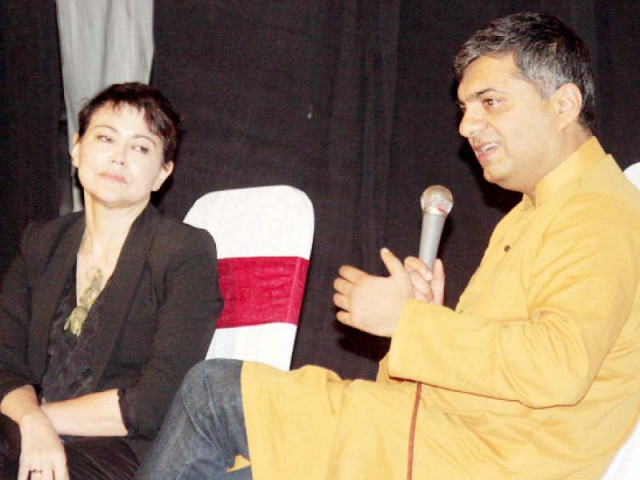The ideal country: ‘Jinnah’s vision of state was a contract among communities’
For Jinnah politics was to be detached from one’s inner self, says historian

Dr Faisal Devji and Dr Maria Misra address the session at the Afkar-i-Taza conference. PHOTO ABID NAWAZ/EXPRESS
Indian nationalist Mohandas Gandhi had sought a society that could run on its own with minimal state interference. Muhammad Ali Jinnah, on the other hand, advocated for a liberal state formed on the basis of a social contract among various communities residing within.
Dr Faisal Devji, University of Oxford’s Centre for Asian Studies director, expressed these views to distinguish between Gandhi and Jinnah’s vision for state and society. He was speaking at Spinning the Nation and Reverse Swing, Gandhi and Jinnah in South Asian History session on the second day of the Afkar-i-Taaza festival.
The other speaker on the panel was Dr Maria Misra, a historian of India and British Empire. Devji said that throughout his career, Jinnah had strived to materialise such a social contract. For Gandhi, he said, a social contract could not be the device to establish harmonious national or communal relations among communities.
In terms of his politics, Misra described Gandhi as a romantic nationalist who saw nation as a family or a community and rejected liberal politics of the kind Jinnah favoured as an evil. He [Gandhi] opposed liberal institutions believing that they would exaggerate differences among various communities in India.
She said because of his emphasis on Indian culture and religion Gandhi could be termed as a populist but he was not a radical politician. His opposition to capitalism was coupled with a political rhetoric of non-violence, she said.
In contrast, she said, for Jinnah politics was based on properly laid out rules and was aimed at evolving a social contract among different communities.
Noting their similar family and academic background, Misra said Gandhi and Jinnah were both born to Gujrati families associated with trade and commerce. She said they abandoned their ancestral occupation to study law. She also noted similarities in the nationalist narrative espoused by the two leaders, saying that their political leanings were moderate and liberal. On the personal life of the two leaders, Devji said that unlike Gandhi whose life was public, there was very little firsthand information about Jinnah’s personal life. For Jinnah, politics was external to one’s inner self, he said.
On Jinnah’s references to Sharia and Islam in years leading up to the Partition, Devji said these statements seemed incoherent and disconnected with his earlier speeches. He said the legacy of both leaders had not survived in its authentic form in either India or Pakistan.
Published in The Express Tribune, April 3rd, 2016.



















COMMENTS
Comments are moderated and generally will be posted if they are on-topic and not abusive.
For more information, please see our Comments FAQ